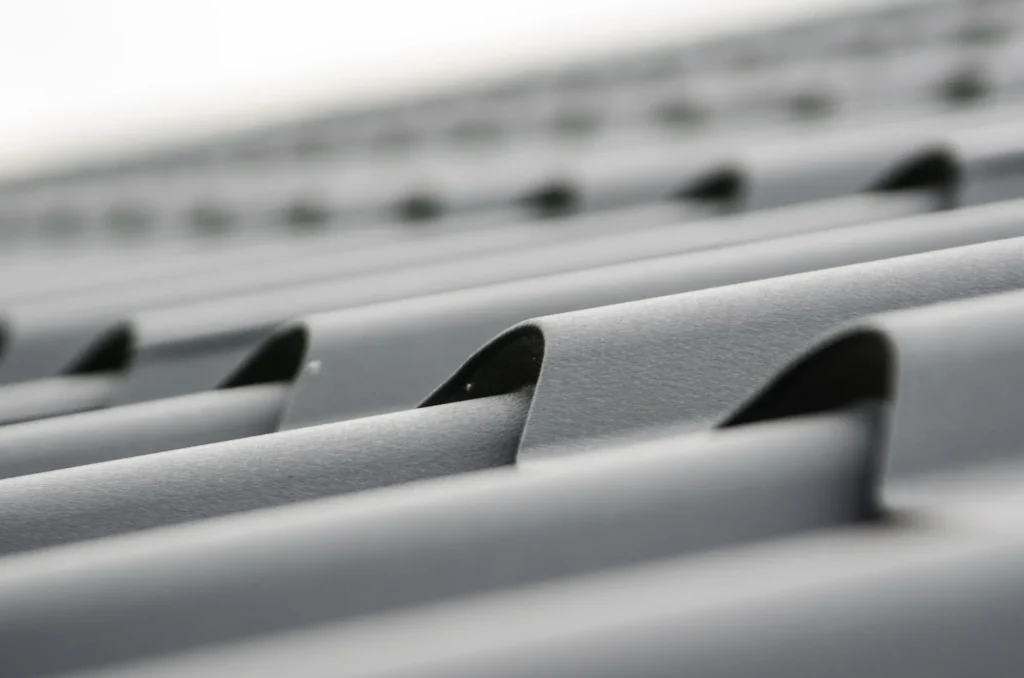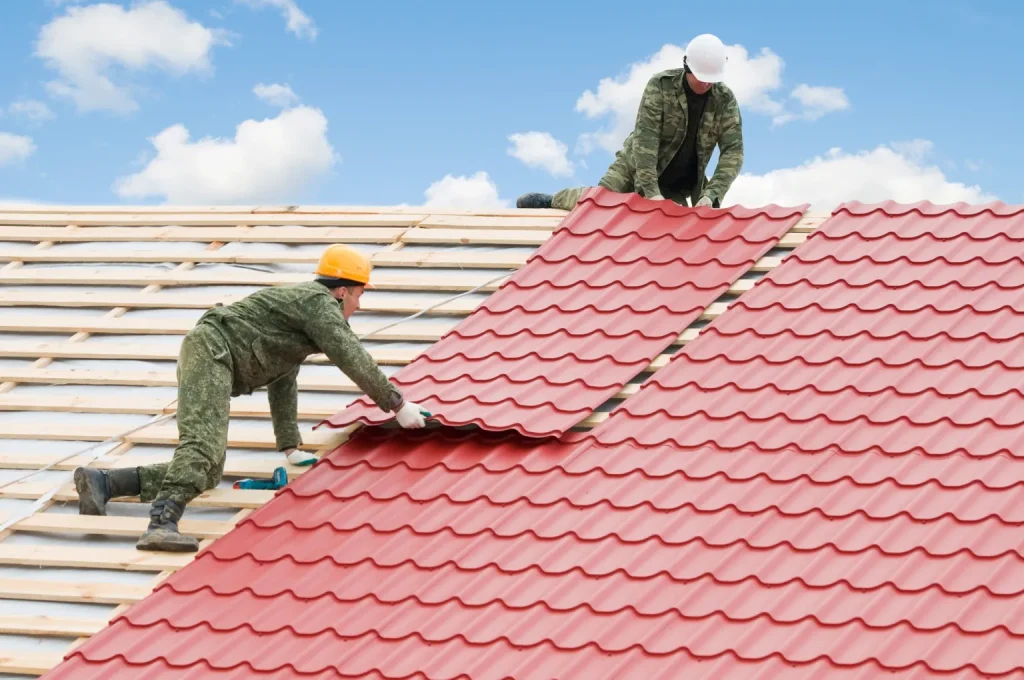In the ever-evolving world of home construction, choosing the right roofing material is a critical decision that can impact both the aesthetics and functionality of your abode. When it comes to roofing, two popular options often stand out – asphalt shingles and durable metal roofing. The debate between metal roofing vs. asphalt shingles has been ongoing, leaving many homeowners grappling with the decision of which option is the perfect fit for their homes. A quality roofing service such as London Eco Metal can guide you when choosing the right roofing system for your needs and its installment, but in the meantime, here’s the complete lowdown on both of these popular roofing materials to help with your decision.
What is Metal Roofing?

Metal roofing is made from metal pieces or tiles. It can be constructed from various metals, including steel, aluminum, zinc, and copper. Metal roofs are popular for their features like durability, longevity, and resistance to weather elements. They come in different styles and finishes, providing a sleek and modern appearance.
What Are Asphalt Shingles?
Asphalt shingles are a popular roofing material made from a base material (usually fiberglass or felt) coated with asphalt and embedded with ceramic granules. They are widely used in residential construction due to their affordability, ease of installation, and variety of available styles and colors.
What Are The differences Between Metal Roofing And Asphalt Shingles?
Metal roofing and asphalt shingles are two common types of roofing materials, each with their own set of characteristics. Here’s a detailed comparison of the differences between metal roofing and asphalt shingles.
Material Composition
- Metal Roofing:
Metal roofs are typically made from steel, aluminum, zinc, copper, or a combination of these metals. The materials are crafted into sheets or panels, and various profiles are available, such as standing seam, corrugated, or metal shingles. Metal roofing provides a modern and sleek appearance, and it comes in different colors and finishes.
- Asphalt Shingles:
Asphalt shingles consist of a base material, usually fiberglass or felt, coated with asphalt. The top surface is embedded with ceramic granules for protection against UV rays. Asphalt shingles offer a classic and traditional look. They come in a wide range of colors and styles to suit different architectural designs.
Durability
- Metal Roofing:
Metal roofs are highly durable and can withstand severe weather conditions, including heavy rain, snow, hail, and high winds. They are impervious to rot, pests and mildew. Metal roofs often have a longer lifespan, typically exceeding 50 years, and may require less frequent replacement compared to asphalt shingles.
- Asphalt Shingles:
Asphalt shingles are durable and can withstand moderate weather conditions. High-quality shingles can last between 20 to 30 years, but they may be more susceptible to damage from severe weather events. Asphalt shingles generally have a shorter lifespan compared to metal roofing.
Cost
- Metal Roofing:
Metal roofing typically has a higher upfront cost compared to asphalt shingles. The cost may vary depending on the type of metal used and the specific profile.
Despite the higher initial investment, the long-term cost of ownership may be lower due to the extended lifespan and potential energy savings.
- Asphalt Shingles:
Asphalt shingles are more budget-friendly, making them a popular choice for homeowners with cost considerations.
The long-term cost may be higher due to the need for more frequent replacements, although the lower initial cost can offset this to some extent.
Aesthetics
- Metal Roofing:
Metal roofing offers a modern and sleek appearance. It comes in various styles and finishes, providing flexibility for homeowners to choose a look that complements their property.
- Asphalt Shingles:
Asphalt shingles provide a classic and traditional roofing aesthetic. With a wide range of colors and styles, they are versatile and widely accepted for their timeless appearance.
Installation
- Metal Roofing:
Metal roofing installation can be more complex and may require specialized skills. However, many professional roofing contractors are experienced in installing metal roofs.
- Asphalt Shingles:
Asphalt shingles are relatively easy to install, and many roofing contractors are familiar with the process. The simplicity of installation contributes to their widespread use in residential construction.
Energy Efficiency
- Metal Roofing:
Energy-efficient properties of metal roofing make it quite popular. It reflects a significant portion of the sun’s rays, reducing heat absorption and contributing to lower cooling costs.
- Asphalt Shingles:
While not as reflective as metal, some asphalt shingles come with reflective coatings that can contribute to energy efficiency. However, they may not offer the same level of reflectivity as metal.
Environmental Impact
- Metal Roofing:
Metal roofing is considered environmentally friendly as it is highly recyclable. Some metal roofing materials also incorporate recycled content.
- Asphalt Shingles:
Asphalt shingles can be recycled, but their production involves the use of fossil fuels. Efforts are being made to increase recycling rates and explore more sustainable options within the asphalt shingle industry.
Why Choose Metal Roofing Over Asphalt Shingles?

Metal roofing and asphalt shingles are two popular choices for roofing materials in residential and commercial construction. Each option has its own set of characteristics, advantages, and considerations. In this detailed exploration, we will delve into the reasons why one might choose metal roofing over asphalt shingles:
- Longevity
The longevity of metal roofing is a compelling factor. With a lifespan often exceeding 50 years, homeowners can enjoy a durable and low-maintenance roofing solution that requires fewer replacements over time.
- Durability
The exceptional durability of metal roofing is one of its primary advantages. Metal roofs can withstand harsh weather conditions. They are resistant to heavy rain, snow, hail, and high winds. Metal roofs do not rot, warp, or crack, and they are impervious to pests. The longevity of metal roofing is a significant selling point, often surpassing 50 years or more.
- Energy Efficiency
A metal roof is recognized for its energy efficiency. It reflects a significant portion of the sun’s rays, reducing the heat absorbed by the roof. This reflective property can contribute to lower cooling costs, especially in warm climates. Some metal roofing materials also have coatings that enhance their solar reflectance.
- Modern Aesthetics
Metal roofing offers a modern and sleek appearance. The various metals and finishes available provide homeowners with flexibility in choosing a style that complements the architectural design of their property. From the classic look of standing seam metal to the textured appeal of metal shingles, there are numerous aesthetic options to suit different tastes.
- Environmental Impact
It’s considered environmentally friendly due to its recyclability. At the end of its long lifespan, metal roofing materials can be recycled, reducing the environmental impact. Additionally, some metal roofing products incorporate recycled content, further enhancing their eco-friendly profile.
- Recyclability
Metal roofing is highly recyclable, reducing its environmental impact. The ability to recycle metal roofing materials at the end of their lifespan aligns with the growing emphasis on sustainability.
- Resale Value
The resale value of homes with metal roofs are often higher. The longevity and durability of metal roofing can be attractive selling points for potential homebuyers.
- Low Maintenance
They require minimal maintenance. They are resistant to issues such as mold, mildew, and algae growth, contributing to a roof that retains its aesthetic appeal over the years.
Final Thoughts
In conclusion, the choice between metal roofing and asphalt shingles depends on a variety of factors, including budget, aesthetics, regional climate, and environmental considerations. Both options have their advantages and you should carefully weigh these factors based on your priorities.

